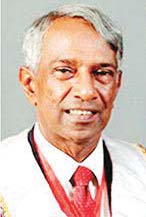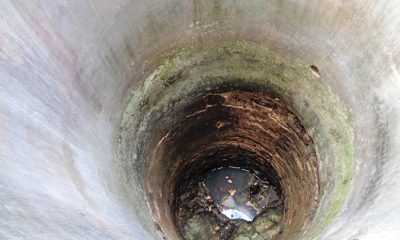Features
Enhancing fall-back power of the brain

 BY Dr B. J. C. Perera
BY Dr B. J. C. Perera
MBBS(Cey), DCH(Cey), DCH(Eng), MD(Paed), MRCP(UK), FRCP(Edin), FRCP(Lon), FRCPCH(UK), FSLCPaed, FCCP, Hony FRCPCH(UK), Hony. FCGP(SL)
Specialist Consultant Paediatrician and Honorary Senior Fellow, Postgraduate Institute of Medicine, University of Colombo, Sri Lanka.
It is a well-known fact that many organs of the human body have some reserve quantum to fall back on during situations where a human being is taxed above its usual calm existence. An excellent example of this is the human heart. In the resting status of the body. the heart beats at around 70 to 80 beats per minute. During strenuous exercise this rate could automatically go up to about 150 or even 200, bringing the reserve power of it into play. The cardiovascular reserve can go up to several times its usual tranquil capacity whenever called upon to provide that extra power.
The notion that the human brain too has fall-back reserve power is a thing that that may surprise many people. As most of us know, we associate the brain with the higher functions of the mind where intelligence and many other cognitive features associated with it make the Homo sapiens to be quite different and differentiate humankind from all other species of the animal kingdom. Yet for all that, with advancing age, impairment of memory is a thing that most people worry about.
By age 60, more than half of adults have concerns about their memory. However, minor memory lapses that occur with age are not usually signs of a serious problem, such as Alzheimer’s disease, but rather the result of normal changes in the structure and function of the brain. However, major and progressive memory loss is a devastating problem for the elderly. Yet for all that, we differ from each other in the way our thinking skills age. One explanation is that some people have better resilience to the effects of ageing because they have developed a better capacity or ‘reserve’ to cope with the changes in the brain that occur with age.
The intellectual power that we can fall back on is referred to as cognitive reserve. Cognitive reserve is the mind’s and brain’s resistance to damage of the brain. One could also rather loosely equate this phenomenon to the ability of the brain to improvise and find alternate ways of getting a job done. It reflects how agile a brain is in pulling in skills and capacities to solve problems and cope with challenges. It is a phenomenon that has to be nurtured and strengthened by learning and experience right throughout a lifetime. Cognitive reserve is developed by an era of education and curiosity right throughout life.
The impression of such reserve power of the brain was first realised and then explored in the late 1980s. That concept which was labelled as cognitive reserve originated when researchers described individuals with no apparent symptoms of dementia or deterioration of the higher functions of the brain who were nonetheless found at autopsy to have brain changes consistent with advanced Alzheimer’s disease. Such observations suggest that there does not appear to be a direct relationship between the degree of brain changes in any given individual and the outward signs of those changes that manifest as loss of cognitive functions.
It was then postulated that these individuals somehow did not show symptoms of the disease while they were alive because they had a large enough cognitive reserve to offset the damage and enable them to continue functioning as usual. The concept of reserve accounts for individual differences in susceptibility to age-related brain changes or Alzheimer’s disease-related pathology. There is evidence that some people can tolerate more of these changes than others and still maintain function.
This curious phenomenon led to intensive research that has shown that people with greater inherent cognitive reserve are better able to stave off or even keep at bay, the symptoms of degenerative brain changes associated with dementia or even some other brain diseases, such as Parkinson disease, multiple sclerosis, or a stroke. A more robust cognitive reserve can also help one to function better and for longer even when one is exposed to unexpected life events, such as stress, surgery, or toxins in the environment. Such circumstances demand extra effort from the brain, somewhat similar to requiring a car to engage another gear.
Research suggests that our level of intelligence, which traces back to childhood as well as our set of lifetime experiences, helps to build cognitive reserve and may account for differences in cognitive reserve between different individuals. The lifetime experiences include education, having an engaging occupation and taking part in stimulating activities; the latter ideally combining leisure activities, learning and social interactions.
The evidence that lifetime experiences help to build cognitive reserve comes from studies of large groups of people over long periods. Such studies have repeatedly found that these life experiences are associated with a slower rate of cognitive decline in normal ageing and reduced risk of developing Alzheimer’s disease.
In other words, higher attainment and engagement appear to protect cognitive function in ageing. Indeed, some studies have suggested that these life experiences may reduce the risk of Alzheimer’s disease by 35-40%. The changes in the brain that are seen in the disease may still occur, but these people cope better and will not ever be diagnosed because they do not present with any symptoms.
The basic perception of cognitive reserve suggests that the brain actively attempts to cope with brain damage by using pre-existing cognitive processing approaches or by enlisting compensatory mechanisms. This would allow an individual with higher cognitive reserves to handle it better to enable the individual to better cope with the brain damage than another with lower cognitive reserves.
It has now been realised that cognitive reserve can be enhanced by a programme of cognitive fitness. Such an initiative would develop the ability of the brain to deal with and function normally when it is induced to call upon the reserve power, especially when disease states take their toll. The very heart and the central cog of a coordinated brain health and cognitive fitness programme involves rather simple but all too familiar lifestyle changes. The cognitive reserve hypothesis gives hope that exposure to various sorts of stimulating activities can help us age successfully. It also leads us to ask what people can do to help increase their cognitive reserve.
It is still unclear what the exact ‘recipe’ for this is. The evidence from studies of large populations suggests that it is exposure to the experiences and activities discussed above across the lifetime that contribute to the reserve, but we do not yet know what specific activities would slow the rate of cognitive decline or reduce the risk of dementia.
Researchers at Harvard Medical School have identified six cornerstones to any effective brain health and cognitive fitness programme. These are as follows:-
Task 1:
Eat a plant-based diet. This is beneficial in many ways and building up cognitive reserves is just one of them. The diet needs to be a good balanced one to supply all macro and micro nutrients.
Task 2:
Exercise regularly. Like the vegetarian diet, this too has a multiplicity of positive benefits. Building up cognitive reserves is just one of them. The nature and severity of the exercise needs to be individualised. Some medical advice would certainly help in that venture.
Task 3:
Get enough sleep. It is well-known that sleep facilitates tissue repair. It is perhaps the same with the neurones and their connecting meshworks as well. A minimum of 6 hours is essential and it is quite good to have 8 hours of quality sleep.
Task 4:
Manage your stress. It has been proven that stress has deleterious effects on many systems of the human body. It is perhaps the same with the brain and the neural tissues.
Task 5:
Nurture social contacts. Good social connections may provide mental stimulation through complex interactions with others and hence build cognitive reserve and maintain healthy cognitive function. This is a very important component of the cognitive fitness initiative.
Task 6:
Continue to challenge the brain everyday. Just as much as regular exercise improves the physical functions and the physical strength of the body, mental exercises are well-known to be beneficial for the proper functioning of the brain. Research studies suggest that doing cognitive tasks that feel difficult, like problem-solving, learning something new, reading a newspaper article and discussing it with a friend, etc.., truly challenge the brain.
This multi-pronged plan includes and integrates proven approaches to committed changes being made in everyday lifestyles. It is advocated that by incorporating simple, specific changes into a daily routine, one could add years of enduring mental stamina and vitality. It is extremely important to realise that these factors are equal parts of a cohesive plan and that they do not work very well in isolation or when they are taken up just as one or two separate efforts. For example, simply eating more fibre or adding a morning walk to your routine is not enough to forestall mental decline. Instead, diet, exercise, sleep, stress management, social interaction, and mental stimulation, all work in harmony, just like in a concert, to yield the desired results.
All that we have undertaken during a lifetime of this worldly experience certainly helps in building up a mental and neurological reserve to enable us to successfully navigate through the drastic effects of age on our mental faculties. There is emerging evidence that even in older ages, commitment to the cause of enhancing that cognitive reserve would certainly help. Old age then becomes a really great pick-up or fizz time.
So, let us go for it.., everybody !!!
The author is grateful to his friend, Professor Nalaka Mendis, for rekindling the writer’s interest in Cognitive Reserve.
Features
Misinterpreting President Dissanayake on National Reconciliation

President Anura Kumara Dissanayake has been investing his political capital in going to the public to explain some of the most politically sensitive and controversial issues. At a time when easier political choices are available, the president is choosing the harder path of confronting ethnic suspicion and communal fears. There are three issues in particular on which the president’s words have generated strong reactions. These are first with regard to Buddhist pilgrims going to the north of the country with nationalist motivations. Second is the controversy relating to the expansion of the Tissa Raja Maha Viharaya, a recently constructed Buddhist temple in Kankesanturai which has become a flashpoint between local Tamil residents and Sinhala nationalist groups. Third is the decision not to give the war victory a central place in the Independence Day celebrations.
Even in the opposition, when his party held only three seats in parliament, Anura Kumara Dissanayake took his role as a public educator seriously. He used to deliver lengthy, well researched and easily digestible speeches in parliament. He continues this practice as president. It can be seen that his statements are primarily meant to elevate the thinking of the people and not to win votes the easy way. The easy way to win votes whether in Sri Lanka or elsewhere in the world is to rouse nationalist and racist sentiments and ride that wave. Sri Lanka’s post independence political history shows that narrow ethnic mobilisation has often produced short term electoral gains but long term national damage.
Sections of the opposition and segments of the general public have been critical of the president for taking these positions. They have claimed that the president is taking these positions in order to obtain more Tamil votes or to appease minority communities. The same may be said in reverse of those others who take contrary positions that they seek the Sinhala votes. These political actors who thrive on nationalist mobilisation have attempted to portray the president’s statements as an abandonment of the majority community. The president’s actions need to be understood within the larger framework of national reconciliation and long term national stability.
Reconciler’s Duty
When the president referred to Buddhist pilgrims from the south going to the north, he was not speaking about pilgrims visiting long established Buddhist heritage sites such as Nagadeepa or Kandarodai. His remarks were directed at a specific and highly contentious development, the recently built Buddhist temple in Kankesanturai and those built elsewhere in the recent past in the north and east. The temple in Kankesanturai did not emerge from the religious needs of a local Buddhist community as there is none in that area. It has been constructed on land that was formerly owned and used by Tamil civilians and which came under military occupation as a high security zone. What has made the issue of the temple particularly controversial is that it was established with the support of the security forces.
The controversy has deepened because the temple authorities have sought to expand the site from approximately one acre to nearly fourteen acres on the basis that there was a historic Buddhist temple in that area up to the colonial period. However, the Tamil residents of the area fear that expansion would further displace surrounding residents and consolidate a permanent Buddhist religious presence in the present period in an area where the local population is overwhelmingly Hindu. For many Tamils in Kankesanturai, the issue is not Buddhism as a religion but the use of religion as a vehicle for territorial assertion and demographic changes in a region that bore the brunt of the war. Likewise, there are other parts of the north and east where other temples or places of worship have been established by the military personnel in their camps during their war-time occupation and questions arise regarding the future when these camps are finally closed.
There are those who have actively organised large scale pilgrimages from the south to make the Tissa temple another important religious site. These pilgrimages are framed publicly as acts of devotion but are widely perceived locally as demonstrations of dominance. Each such visit heightens tension, provokes protest by Tamil residents, and risks confrontation. For communities that experienced mass displacement, military occupation and land loss, the symbolism of a state backed religious structure on contested land with the backing of the security forces is impossible to separate from memories of war and destruction. A president committed to reconciliation cannot remain silent in the face of such provocations, however uncomfortable it may be to challenge sections of the majority community.
High-minded leadership
The controversy regarding the president’s Independence Day speech has also generated strong debate. In that speech the president did not refer to the military victory over the LTTE and also did not use the term “war heroes” to describe soldiers. For many Sinhala nationalist groups, the absence of these references was seen as an attempt to diminish the sacrifices of the armed forces. The reality is that Independence Day means very different things to different communities. In the north and east the same day is marked by protest events and mourning and as a “Black Day”, symbolising the consolidation of a state they continue to experience as excluding them and not empathizing with the full extent of their losses.
By way of contrast, the president’s objective was to ensure that Independence Day could be observed as a day that belonged to all communities in the country. It is not correct to assume that the president takes these positions in order to appease minorities or secure electoral advantage. The president is only one year into his term and does not need to take politically risky positions for short term electoral gains. Indeed, the positions he has taken involve confronting powerful nationalist political forces that can mobilise significant opposition. He risks losing majority support for his statements. This itself indicates that the motivation is not electoral calculation.
President Dissanayake has recognized that Sri Lanka’s long term political stability and economic recovery depend on building trust among communities that once peacefully coexisted and then lived through decades of war. Political leadership is ultimately tested by the willingness to say what is necessary rather than what is politically expedient. The president’s recent interventions demonstrate rare national leadership and constitute an attempt to shift public discourse away from ethnic triumphalism and toward a more inclusive conception of nationhood. Reconciliation cannot take root if national ceremonies reinforce the perception of victory for one community and defeat for another especially in an internal conflict.
BY Jehan Perera
Features
Recovery of LTTE weapons

I have read a newspaper report that the Special Task Force of Sri Lanka Police, with help of Military Intelligence, recovered three buried yet well-preserved 84mm Carl Gustaf recoilless rocket launchers used by the LTTE, in the Kudumbimalai area, Batticaloa.
These deadly weapons were used by the LTTE SEA TIGER WING to attack the Sri Lanka Navy ships and craft in 1990s. The first incident was in February 1997, off Iranativu island, in the Gulf of Mannar.
Admiral Cecil Tissera took over as Commander of the Navy on 27 January, 1997, from Admiral Mohan Samarasekara.
The fight against the LTTE was intensified from 1996 and the SLN was using her Vanguard of the Navy, Fast Attack Craft Squadron, to destroy the LTTE’s littoral fighting capabilities. Frequent confrontations against the LTTE Sea Tiger boats were reported off Mullaitivu, Point Pedro and Velvetiturai areas, where SLN units became victorious in most of these sea battles, except in a few incidents where the SLN lost Fast Attack Craft.

Carl Gustaf recoilless rocket launchers
The intelligence reports confirmed that the LTTE Sea Tigers was using new recoilless rocket launchers against aluminium-hull FACs, and they were deadly at close quarter sea battles, but the exact type of this weapon was not disclosed.
The following incident, which occurred in February 1997, helped confirm the weapon was Carl Gustaf 84 mm Recoilless gun!
DATE: 09TH FEBRUARY, 1997, morning 0600 hrs.
LOCATION: OFF IRANATHIVE.
FACs: P 460 ISRAEL BUILT, COMMANDED BY CDR MANOJ JAYESOORIYA
P 452 CDL BUILT, COMMANDED BY LCDR PM WICKRAMASINGHE (ON TEMPORARY COMMAND. PROPER OIC LCDR N HEENATIGALA)
OPERATED FROM KKS.
CONFRONTED WITH LTTE ATTACK CRAFT POWERED WITH FOUR 250 HP OUT BOARD MOTORS.
TARGET WAS DESTROYED AND ONE LTTE MEMBER WAS CAPTURED.
LEADING MARINE ENGINEERING MECHANIC OF THE FAC CAME UP TO THE BRIDGE CARRYING A PROJECTILE WHICH WAS FIRED BY THE LTTE BOAT, DURING CONFRONTATION, WHICH PENETRATED THROUGH THE FAC’s HULL, AND ENTERED THE OICs CABIN (BETWEEN THE TWO BUNKS) AND HIT THE AUXILIARY ENGINE ROOM DOOR AND HAD FALLEN DOWN WITHOUT EXPLODING. THE ENGINE ROOM DOOR WAS HEAVILY DAMAGED LOOSING THE WATER TIGHT INTEGRITY OF THE FAC.
THE PROJECTILE WAS LATER HANDED OVER TO THE NAVAL WEAPONS EXPERTS WHEN THE FACs RETURNED TO KKS. INVESTIGATIONS REVEALED THE WEAPON USED BY THE ENEMY WAS 84 mm CARL GUSTAF SHOULDER-FIRED RECOILLESS GUN AND THIS PROJECTILE WAS AN ILLUMINATER BOMB OF ONE MILLION CANDLE POWER. BUT THE ATTACKERS HAS FAILED TO REMOVE THE SAFETY PIN, THEREFORE THE BOMB WAS NOT ACTIVATED.

Sea Tigers
Carl Gustaf 84 mm recoilless gun was named after Carl Gustaf Stads Gevärsfaktori, which, initially, produced it. Sweden later developed the 84mm shoulder-fired recoilless gun by the Royal Swedish Army Materiel Administration during the second half of 1940s as a crew served man- portable infantry support gun for close range multi-role anti-armour, anti-personnel, battle field illumination, smoke screening and marking fire.
It is confirmed in Wikipedia that Carl Gustaf Recoilless shoulder-fired guns were used by the only non-state actor in the world – the LTTE – during the final Eelam War.
It is extremely important to check the batch numbers of the recently recovered three launchers to find out where they were produced and other details like how they ended up in Batticaloa, Sri Lanka?
 By Admiral Ravindra C. Wijegunaratne
By Admiral Ravindra C. Wijegunaratne
WV, RWP and Bar, RSP, VSV, USP, NI (M) (Pakistan), ndc, psn, Bsc (Hons) (War Studies) (Karachi) MPhil (Madras)
Former Navy Commander and Former Chief of Defence Staff
Former Chairman, Trincomalee Petroleum Terminals Ltd
Former Managing Director Ceylon Petroleum Corporation
Former High Commissioner to Pakistan
Features
Yellow Beatz … a style similar to K-pop!

 Yes, get ready to vibe with Yellow Beatz, Sri Lanka’s awesome girl group, keen to take Sri Lankan music to the world with a style similar to K-pop!
Yes, get ready to vibe with Yellow Beatz, Sri Lanka’s awesome girl group, keen to take Sri Lankan music to the world with a style similar to K-pop!
With high-energy beats and infectious hooks, these talented ladies are here to shake up the music scene.
Think bold moves, catchy hooks, and, of course, spicy versions of old Sinhala hits, and Yellow Beatz is the package you won’t want to miss!
According to a spokesman for the group, Yellow Beatz became a reality during the Covid period … when everyone was stuck at home, in lockdown.
“First we interviewed girls, online, and selected a team that blended well, as four voices, and then started rehearsals. One of the cover songs we recorded, during those early rehearsals, unexpectedly went viral on Facebook. From that moment onward, we continued doing cover songs, and we received a huge response. Through that, we were able to bring back some beautiful Sri Lankan musical creations that were being forgotten, and introduce them to the new generation.”
The team members, I am told, have strong musical skills and with proper training their goal is to become a vocal group recognised around the world.
Believe me, their goal, they say, is not only to take Sri Lanka’s name forward, in the music scene, but to bring home a Grammy Award, as well.
“We truly believe we can achieve this with the love and support of everyone in Sri Lanka.”
The year 2026 is very special for Yellow Beatz as they have received an exceptional opportunity to represent Sri Lanka at the World Championships of Performing Arts in the USA.
Under the guidance of Chris Raththara, the Director for Sri Lanka, and with the blessings of all Sri Lankans, the girls have a great hope that they can win this milestone.
“We believe this will be a moment of great value for us as Yellow Beatz, and also for all Sri Lankans, and it will be an important inspiration for the future of our country.”
Along with all the preparation for the event in the USA, they went on to say they also need to manage their performances, original song recordings, and everything related.

The year 2026 is very special for Yellow Beatz
“We have strong confidence in ourselves and in our sincere intentions, because we are a team that studies music deeply, researches within the field, and works to take the uniqueness of Sri Lankan identity to the world.”
At present, they gather at the Voices Lab Academy, twice a week, for new creations and concert rehearsals.
This project was created by Buddhika Dayarathne who is currently working as a Pop Vocal lecturer at SLTC Campus. Voice Lab Academy is also his own private music academy and Yellow Beatz was formed through that platform.
Buddhika is keen to take Sri Lankan music to the world with a style similar to K-Pop and Yellow Beatz began as a result of that vision. With that same aim, we all work together as one team.
“Although it was a little challenging for the four of us girls to work together at first, we have united for our goal and continue to work very flexibly and with dedication. Our parents and families also give their continuous blessings and support for this project,” Rameesha, Dinushi, Newansa and Risuri said.
Last year, Yellow Beatz released their first original song, ‘Ihirila’ , and with everything happening this year, they are also preparing for their first album.
-

 Features3 days ago
Features3 days agoMy experience in turning around the Merchant Bank of Sri Lanka (MBSL) – Episode 3
-

 Business4 days ago
Business4 days agoZone24x7 enters 2026 with strong momentum, reinforcing its role as an enterprise AI and automation partner
-

 Business3 days ago
Business3 days agoRemotely conducted Business Forum in Paris attracts reputed French companies
-

 Business3 days ago
Business3 days agoFour runs, a thousand dreams: How a small-town school bowled its way into the record books
-

 Business3 days ago
Business3 days agoComBank and Hayleys Mobility redefine sustainable mobility with flexible leasing solutions
-

 Business4 days ago
Business4 days agoHNB recognized among Top 10 Best Employers of 2025 at the EFC National Best Employer Awards
-

 Business4 days ago
Business4 days agoGREAT 2025–2030: Sri Lanka’s Green ambition meets a grid reality check
-

 Editorial6 days ago
Editorial6 days agoAll’s not well that ends well?



















